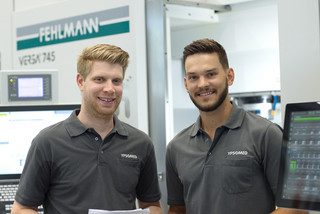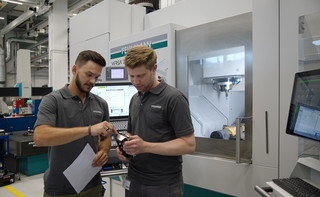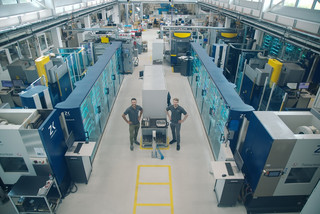Ypsomed expands toolmaking capacity in Switzerland with Fehlmann technology
Ypsomed is investing in a second state-of-the-art toolmaking facility at its Solothurn site to double its production of injection molding tools. In an interview with SMM Schweizer Maschinenmarkt, Elias Wermuth (Manager Tool Manufacturing) and Michael Maurer (Project Manager Tool Manufacturing) discuss the importance of precision, automation, and training in this process and explain why Ypsomed has relied on Fehlmann machining centers for over 20 years. The new production cell, which consists of one VERSA 945 and two VERSA 745 machines networked via Erowa linear automation, exemplifies precision, repeatability, and Swiss engineering.
Ypsomed is investing in a second production facility for the manufacture of injection molding tools at its Solothurn site. Can you briefly explain exactly what this involves?
Michael Maurer: We are investing in a completely new tool manufacturing facility for an additional 40 employees in order to double the output we currently generate at our headquarters in Burgdorf. In Solothurn, production will mirror that in Burgdorf, so to speak. In the future, injection molding tools will be manufactured in parallel at both locations under largely identical conditions. Investments are being made in 5-axis milling machines, grinding machines, sinker and wire EDM machines, and various machines for trainees, such as lathes and 3-axis milling machines.
Elias Wermuth: The largest investment volume is accounted for by three interlinked Fehlmann machines with linear automation from Erowa: one Fehlmann VERSA 945 and two Fehlmann VERSA 745, the latter also with a grinding option. In addition, a washing machine and a measuring machine will be integrated into the manufacturing process. In the field of die-sinking EDM, investments are being made in a fully networked milling and die-sinking EDM line from Zimmer & Kreim and OPS Ingersoll.
Before we go into more detail about your "Tool Manufacturing" division, could you give us an overview of the Ypsomed company and explain the role played by the Tool Manufacturing division?
E. Wermuth: Ypsomed is headquartered in Burgdorf and has several locations worldwide. With over 2,500 employees, the company specializes in the manufacture of innovative injection and infusion systems for self-medication. For example, for the treatment of diabetes or other chronic diseases. The product range includes insulin pumps, pen injection systems, autoinjectors, and infusion sets. Our toolmaking department, where 90 employees, including 20 apprentices, work, plays a key role in the manufacture of the product range. The high proportion of apprentices is a strategic decision to specifically develop and promote future specialists in tool manufacturing.
If I understand correctly, Ypsomed manufactures the pen injectors using injection molding, and the corresponding injection molding tools are designed and manufactured in Tool Manufacturing?
E. Wermuth: That's right, we are, so to speak, the internal supplier of injection molding tools for Ypsomed's pen production. We also offer a service for revising the injection molding tools, but that's not all. Without our injection molding tools, there would be no pen injectors. The injection molding tools used in this segment are of the highest quality. It takes us around 2,000 working hours to manufacture a medium-sized pen injector injection molding tool. To put that into perspective, there are 8,760 hours in a year. That means you need about one person per tool per year. Our current output is 50 to 60 tools per year. The expertise we have gained over the last 30 years is one of Ypsomed's core competencies. Precision, surface quality, and complexity are the fundamentals we deal with every day in toolmaking. We are continuously expanding our vertical range of manufacture. Our toolmaking department is also responsible for the operating resources—which range from testing aids to automated small systems for assembling pens—involved in the manufacture and assembly of pen injectors.
Who actually develops the pen injectors?
M. Maurer: The pen injectors are developed by Ypsomed's Product Development department, which is located outside the Tool Manufacturing Organization. Product Development is in charge. Ultimately, this is because the requirements for such a medical device are clearly derived from its benefits and safety for the patient. As I said, we are an internal service provider. Ultimately, we have to develop the tools to manufacture the pen injectors in large quantities in a process-reliable manner.
Once a tool is finished, what happens next? How are the tools actually tested?
E. Wermuth: A finished injection molding tool undergoes several tests and qualifications on our injection molding machines in the affiliated "technical center" (editor's note: the technical center is directly integrated into the tool shop and has several injection molding machines on which the injection molding tools can be tested and trialed under production conditions). Each new or reconditioned tool is sampled and qualified in our technical center, where the quality of the injection-molded parts is checked. Typical test runs last between 4 and 8 hours. During these initial production tests, our injection molding tools are put through their paces. This shows whether the 2,000 hours we have invested in a tool have been put to good use in terms of quality.
And then the injection molding tools go into production?
M. Maurer: Correct, once the injection molding tools have been approved as part of our testing. In production, an injection molding tool typically has to run reliably for 5 to 10 million cycles. If, during the production process, our colleagues recognize that there is a need for optimization, our specialists are called in. In such cases, we work very closely with product development and production to evaluate what ideally needs to be adjusted in order to perfect the production process.
E. Wermuth: It may be that something needs to be changed in the design of the pen injector and/or the injection molding tool. This depends on various factors, including the process conditions during injection molding. This varies from case to case and is very complex. The experience of our employees is immensely important in such optimization runs.
Can you tell us within what tolerance ranges you produce and what that means for your employees?
M. Maurer: We have already mentioned that 2,000 working hours go into a tool. We have to adhere to very narrow tolerance ranges throughout the entire development period. In addition, we often have to produce very small series, from one to a maximum of ten identical tool shapes. We also have to manufacture these small series automatically in order to increase profitability. This means that we are operating at the limits of what is technically feasible in terms of manufacturing.
You consistently rely on Fehlmann machine tools and are investing in new Fehlmann machines again, as you told me beforehand. Can you explain this decision?
E. Wermuth: We have long relied consistently on Fehlmann machine tools for hard and soft machining in toolmaking. We do this quite deliberately, because over the last 20 years, Fehlmann machining centers have proven to be the most accurate machine tools in our required size segment. With the Fehlmann VERSA machining centers, we achieve the required tolerance ranges for milling, even in our small series production. Since Fehlmann has equipped certain VERSA models with an integrated grinding option, process reliability has increased even further. From today's perspective, there is no alternative to the VERSA machining centers.
What specific requirements are placed on the machining centers?
E. Wermuth: They have to run around the clock. Then we need precision, precision, and more precision. If we manufacture the same component ten times, the repeat accuracy must be within a tolerance range of 3 µm. In our experience, the Fehlmann machines achieve this repeat accuracy with a high degree of process reliability. The run-in of the components is also extremely clear with the VERSA machines because you are very close to the machining area and the component. Fehlmann has developed a really good machine tool concept with the VERSA line.
Now to the actual investment project. You said that you are setting up an identical production facility in Solothurn to the one in Burgdorf. Why and how are you doing this?
E. Wermuth: Precision, repeatability, and productivity are the most important criteria for our tool and mold making. Our current machine park in Burgdorf is perfectly tailored to these needs and fully meets our requirements. The fact that we are planning almost exactly the same production in Solothurn is ultimately also due to the excellent experience we have had in the past with Fehlmann machines and the die-sinking EDM machine from Zimmer and Kreim in combination with OSG Ingersoll.
M. Maurer: A very decisive factor is that we have a single point of contact for both locations – Burgdorf and Solothurn – in the areas of milling and die-sinking EDM. In addition, our goal is for our employees at both locations to be able to work productively quickly. This is much easier to achieve when we work with the same machines and systems at both locations. For example, we can use the CAM programs we have developed at both locations.
As you already mentioned, investments are also being made in the area of eroding.
M. Maurer: Here, we are investing in a complete erosion line consisting of an OSG milling machine for sinking electrodes, three OSG sinking erosion machines, a 3D measuring machine, and a washing system. The systems are connected to each other via linear automation from Zimmer & Kreim. As described above, we already use Zimmer & Kreim in combination with OSG Ingersoll in Burgdorf and have had very good experiences with the systems.
What role does training play in tool manufacturing?
E. Wermuth: In general, our region is very well positioned in the field of traditional manufacturing. However, tool and mold making is a specialized, know-how-driven area of technology within the manufacturing spectrum. That is why our own training program is so important. We offer a huge range of diversity for trainees. The requirements are high. We have trainees who are completing their final projects in the field of die-sinking EDM or wire EDM. One apprentice is about to graduate in the field of assembly. In order to make the future field of work as varied as possible, we make sure that our employees are deployed in as many different areas as possible.
What does the investment mean for Switzerland as a manufacturing location?
M. Maurer: From day one, trainees are fully integrated into toolmaking. As it is becoming increasingly difficult to find skilled workers who meet our requirements for tool and mold making in this high-end segment, we need to train consistently. We will communicate that we are training polymechanics in Solothurn in due time. Their future workplaces are top-notch; they will be able to work on high-end machines and in a modern production environment. The investment in Solothurn is an important contribution to strengthening Switzerland as a manufacturing location.
Contact
Ypsomed AG
Brunnmattstrasse 6
3401 Burgdorf, Switzerland
www.ypsomed.com
Photos and Article by Ypsomed and Matthias Böhm www.maschinenmarkt.ch



